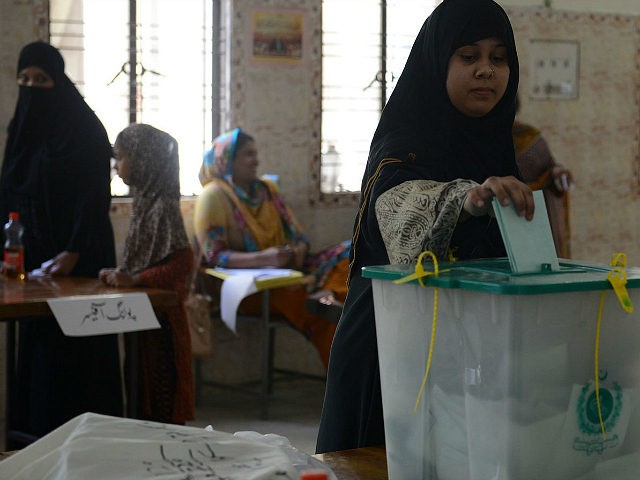Pakistan’s election commission appears powerless to prevent the “political mainstreaming” of Islamic extremists and candidates charged with crimes ranging from corruption and rape to human smuggling and murder, rendering the country’s upcoming race a springboard for radicals and alleged criminals, according to several news reports.
The sheer number of candidates linked to Islamic extremist groups of all shape, color, and sizes is making it difficult for the election commission to deny them registration. When the election body tries to do so, the candidate simply attaches his name to little known “dormant” political entities while maintaining their ties to banned terrorist organizations.
Besides the hundreds of candidates running under political parties linked to at least one U.S.-designated terrorist group and other jihadi organizations, Geo News reports:
[A]round 2,720 candidates contesting the elections face corruption, criminal, rape, dual nationality, money laundering, extortion, loans/bank defaulting, human smuggling and murder charges in Pakistan … The Pakistan Tehreek-e-Insaf (PTI), Pakistan People’s Party (PPP), Pakistan Muslim League-Nawaz (PML-N) and the Muttahida Qaumi Movement-Pakistan (MQM-Pakistan) have awarded more tickets to such candidates as compared to other smaller political parties.
The Hafiz Saeed-led Jamaat-ud-Dawah (JuD) organization, a known affiliate of the Lashkar-e-Taiba (LeT) jihadist group that carried out the deadly 2008 Mumbai attack, launched the Milli Muslim League (MML) party this year.
U.S. authorities have placed a $10 million bounty on Saeed for his alleged involvement in 2008 terror attacks in Mumbai, India, that killed about 166 people and injured hundreds of others. The United States has designated LeT as a foreign terrorist organization.
When the Election Commission of Pakistan (ECP) denied MML candidates registration — arguing that the party was an offshoot of the JuD, deemed a terrorist group by the United Nations — JuD attached the contenders’ names to the Allaha-u-Akbar Tehreek (AAT) party that is already registered with the ECP, rendering them eligible to run.
The move allowed the terrorist group JuD alone to field 265 candidates for national and provincial assembly seats across the country in the July 25 general election, making the party the most prominent one with jihadi links.
JuD reportedly vowed to make the country a “citadel of Islam.” The Diplomat and other news outlets acknowledge that the terrorist organization is not the only one fielding candidates during the upcoming elections, reporting:
The lead-up to the general election in Pakistan—now almost one month away—appears to have set up a launch pad for various extremist groups based in the country. A number of radical groups of all hues and colors have not only launched political campaigns to make inroads into the national parliament, but are also leading efforts to undermine the government’s anti-terror narrative to justify their respective campaign agendas. Certainly, sectarian and other militant groups seem to have obtained strong footing to regain their political, electoral, and social space, which may have come under threat after the last few years’ broad counter terrorism efforts on the part of the Pakistani state.
Pakistan’s election commission appears powerless to stop the “political mainstreaming” of Islamic extremisms-affiliated candidates who likely have the backing from elements within the Pakistani state as it allows militants to run independently or allied to unknown religious parties, Asia Times reports.
“Militant groups linked to known terror organizations are fully prepared to participate in Pakistan’s elections next month either independently or in affiliation with unknown religious political entities,” the article notes.
“The Election Commission of Pakistan (ECP) seems helpless and unable to stop the ‘political mainstreaming’ of extremist elements who may have backing and support from elements of the Pakistani state,” it adds.

COMMENTS
Please let us know if you're having issues with commenting.